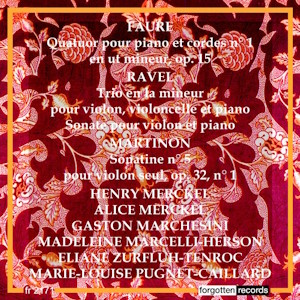
Gabriel Fauré (1845-1924)
Piano Quartet No. 1 in C minor, Op. 15 (1883)
Maurice Ravel (1875-1937)
Piano Trio in A minor (1914)
Violin Sonata (1923-27)
Jean Martinon (1910-1976)
Sonatine No.5 for solo violin, Op.32 No.1 (1942)
Henry Merckel (violin)
Madeleine Marcelli-Herson (cello)
Eliane Zurfluh-Tenroc (piano: trio), Marie-Louise Pugnet-Caillard (piano: sonata)
rec. 1931-50, Paris
Forgotten Records FR2171 [79]
Henry Merckel was an exacting teacher. He was also, apparently, heartily disliked by his colleagues when he was concertmaster of the Orchestre de la Société des Concerts du Conservatoire, to such an extent that he took an unexplained year-long leave of absence, and soon after left permanently to join the Orchestre du Théâtre National de l’Opéra de Paris. I’ve read that he was particularly insubordinate during a visit by Heifetz, no less. This is by-the-way but I have to say, as a long-standing admirer of Merckel’s musicianship, it’s something of a guilty biographical pleasure.
The recordings in this release are all French and date from the Ravel Trio of 1931 to the Sonata, recorded in 1950. The disc begins, though, with Fauré’s Piano Quartet, Op.15, recorded in November 1933, and taken from a Gramophone 78 set. Perhaps the most famous ‘historic’ recording of this work – the quotation marks are because the recording was made as late as 1956 – is that of Marguerite Long with the Pasquier Trio, though just a couple of years later come a commanding rendition from the Kogan-Rostropovich-Barshai-Gilels quartet. Merckel’s Piano Quartet included his violist sister Alice, cellist Gaston Marchesini and pianist Eliane Zurfluh-Tenroc. The ensemble generates strong rhythmic vitality with fine ensemble in the opening movement – it’s attractively lean, not richly warm – though the Scherzo is rather more measured than one usually finds; what it wins in playfulness it tends to lose in vitality. By contradistinction the Adagio is really fast. Merckel was inclined to take fast tempi and here he is clearly the leading figure in the ensemble ensuring the inner two movements take on an interesting character. The finale is more measured than the other classic 1930s recording by Casadesus and Calvet, Pascal and Mas, who adopt a more modern – for which read ‘conventional’ – sense of proportion.
Ravel’s Trio features the same cellist and pianist. Forgotten Records give brief biographies of the musicians who play in the disc so one can read about their careers there, not least Zurfluh-Tenroc who remains an interesting figure. This 1931 recording, again taken from Gramophone 78s, suffers the most from a series of clicks and scratches. Once again there’s a sense of tonal asperity from time to time and with it a definably French sense of clarity of projection. Cellist Madeleine Marcelli-Herson was a pupil of André Hekking but has something of Maurice Maréchal’s woody tone. The outer movements are quite fast and the Pantoum second movement is, justly, full of fancy and fire.
After the war Merckel and pianist Marie-Louise Pugnet-Caillard recorded the Violin Sonata. It’s a reading of precision, directness and clarity but with sufficient metrical flexibility to impart a sense of affection. The Blues movement has some ‘straight’ pizzicati, Merckel exuding a fine sense of piquancy in his phrasing and rightly understating the demotic elements. The perpetuum mobile finale is dispatched with élan. The final work is Jean Martinon’s seven-minute Sonatine No.5, composed in 1942 and recorded here seven years later in the Salle Chopin and, like the Sonata, for Polydor. It’s a superior composition, slightly Bachian but independent and full of strong flourishes. The second section has a three-in-one layout and encodes some curious Spanishry from time to time. Merckel plays it splendidly.
With the exception of those noticeable ticks, the transfers are lifelike and attractive with no noticeable or troublesome noise suppression. This fine release presents Merckel solo, as a duo partner, with his trio and piano quartet. He may have been a difficult man but he was a marvellous musician.
Jonathan Woolf
| Availability |  |

















